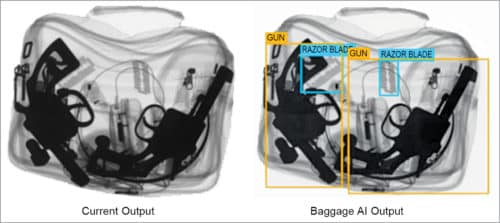With millions of people travelling during the holidays, it is a busy time for any airport and/or metro station. Long lines, delays and pushing carry-ons into a scanner are common things people encounter. Currently, information is sent to the computer it is connected to, which identifies the objects using identification algorithms. Algorithms calculate z effective number (number of protons in a nucleus) and mass density of objects in the bag to construct an image showing the position of objects and their density. That is how existing technology differentiates flour from cocaine, talcum powder from explosive ones and regular plastic from a bomb casing.
Manual detection of banned items in x-ray images is an intricate task and is highly prone to human error due to lethargy. Baggage handling and security are major operational challenges, and sometimes contribute to flight delays as well. To mitigate these challenges, a high-performance intelligent baggage scanner system is needed.
BaggageAI has been developed targeting airports for the most frequent common items, which are contraband like power bank, coconut, lighter and e-cigarette. It has been tested by Delhi International Airport Ltd, India. The solution has also been selected by Airport Authority of India for pilot and deployment to improve efficiency of security personnel.
It is a sophisticated high-performance artificial intelligence (AI)-based system for automatic object detection of banned items in baggage through x-ray images. It looks at each image like a human eye, outlines banned objects and sends alerts to the screen. This is very different from density-based object detection. Existing scanners work on manual detection, but this solution automates the process of finding and locating prohibited items in the x-ray image of the scanned baggage.
BaggageAI can scan thirty images per second, and detect banned objects from 2D black-and-white x-ray images, coloured x-ray images as well as 3D CT scan images. It does not need any extra hardware and can be integrated with the existing 2D or 3D scanning machines to improve their performance. It helps detect threats with high accuracy and efficiency, and reduces false alarms, saving invaluable time.
It has a high throughput of up to thirty images per second, which helps airports handle more passengers and flights per day, resulting in higher revenues and profits. This boosts passenger security significantly by removing human errors in the baggage screening process. It can be effectively deployed at places with high passenger traffic such as airports, metros, malls and railway stations where there is a security risk.

“BaggageAI has deep learning algorithms at its core so a significant time was taken to develop it. Getting the right data and testing it in a real-time situation were some of the major challenges faced by the team. It is being tested by multiple vendors across Europe and North America. The current system is under constant improvement and will be improved to be used across verticals like vehicle scanning, cargo scanning and others,” says Himanshu Arora, co-founder, Dimensionless Technologies Pvt Ltd.






